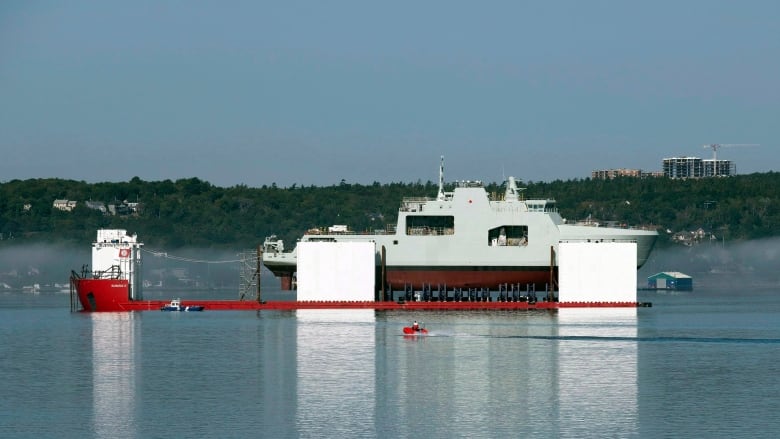New Canadian navy ships to be affiliated with Inuit communities

In a move designed to deepen ties with Inuit Nunangat — the Inuit regions of Canada — the Government of Canada has announced each of its six new Arctic offshore patrol ships will be affiliated with Inuit and Inuvialuit communities in Nunavut, Nunavik, Nunatsiavut and the Inuvialuit settlement region.
The first affiliation was announced Monday in Iqaluit, tying HMCS Harry DeWolf to Nunavut’s Qikiqtani region, which includes 13 communities on Baffin Island and throughout the Arctic archipelago.
Affiliation was described as an important naval tradition in a press release Monday.
“It’s an exceptional opportunity to create long-lasting relationships with the local communities as our navy gets ready to operate more fully in the North,” said Commodore Richard Feltham, director general of naval force development.
“[It’s] an opportunity we can’t waste and we have to build a foundation of relationships and common understanding as we move forward. It’s a great opportunity and an honour.”
The six new navy vessels come at a cost of $3.5 billion. Two more vessels were recently ordered to buttress the Canadian Coast Guard. Last week the federal government filed a claim to sovereignty over a region that includes the seabed beneath the North Pole.
Nunavut Premier Joe Savikataaq said it was important for Canada to assert its sovereignty over Arctic waters and waterways.
“Some foreign countries have stated … it is international waters,” Savikataaq said. “The federal government — and we within Nunavut — disagree with that. It is within Canada, it is Canadian waters. If the navy has a presence in those waters it just reinforces it is our waters.”
‘Spirit of reconciliation’

P.J. Akeeagok, president of the Qikiqtani Inuit Association, said in the press release that the association “welcomes the future HMCS Harry DeWolf “in a “spirit of reconciliation.”
In what has been described as an attempt to promote Canada’s Arctic sovereignty in the 1950s, many Inuit families were forced from their traditional homelands and relocated to uninhabited outposts, such as Grise Fiord, in the High Arctic.
Those families met with harsh, unfamiliar conditions and received little to none of the support promised to them by the federal government of the time. In 2010, the federal government apologized for those forced relocations.
HMCS Harry DeWolf is named after the vice-admiral who oversaw the rescue of 42 sailors from HMCS Athabaskan on April 29, 1944, during the Second World War. Feltham said the ship is expected to be in service by 2020 when it will conduct Arctic sovereignty patrols, and patrols in other regions across the country.
“We as a navy are looking forward to the Harry DeWolf coming into operations in 2020, coming up to operate into our North and creating connections with communities in the North,” Feltham said.
Written by Walter Strong with files from Toby Otak
Related stories from around the North:
Canada: Senate report says Canada’s coast guard should recruit Inuktitut speakers, CBC News
Norway: Norway, Russia team up for search and rescue exercise in Barents Sea, The Independent Barents Observer
United States: More assertive U.S. Arctic policy puts Ottawa and Washington on collision course, Radio Canada International


